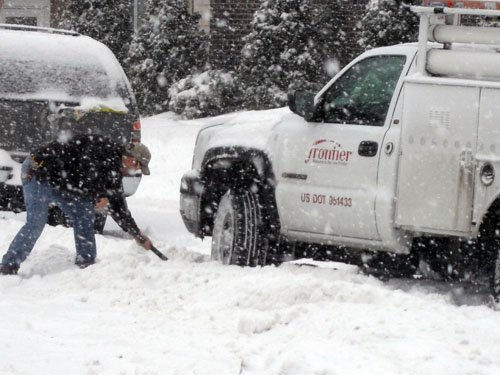
H.129 will insure rural North Carolina's broadband will resemble the backwaters of the Great Dismal Swamp.
Despite promises to protect North Carolina’s existing community-owned broadband providers, Reps. Julia “My Word is My Bond” Howard and Marilyn “I Do What Time Warner Tells Me” Avila have reneged and intend to ram through their anti-community-broadband bulldozer bill.
Stop the Cap! learned this evening that Avila has no intention of meeting with North Carolina communities again, even as resolutions continue to pile up in Raleigh condemning their special interest legislation.
Asheville and Rockingham County have joined the city of Raleigh issuing resolutions opposing H129 and are openly wondering why state legislators are so contemptuously overruling the interests of North Carolina communities for the benefit of out-of-state corporations.
The answer, clearly, is money.
Rep. Howard apparently answers to the interests of companies like AT&T, which has donated more than $1,500 to her campaign, CenturyLink — $4,000, and Time Warner Cable, which so far has shorted her with just $750. It evidently doesn’t take much to influence a legislator these days, and we anticipate her telecommunications contributions will spike in the near future for a job well done. That enormous contribution from CenturyLink is telling, considering they are not the primary phone company in Howard’s district.
As a result of the sellout, H129 will likely move to the Finance Committee as early as next Thursday, effectively unchanged from its original. The implications for the state are staggering, particularly if it drives existing community networks out of business. That will take the state’s bond rating with it.
The sad part of all this is that both representatives were elected to serve the interests of their districts, and instead they are paying more attention to the well being of big cable and phone companies who honestly don’t need their help to earn enormous profits in the state.
While unserved communities and those stuck with dismal, antiquated DSL service have their pleas for better broadband ignored, Avila and Howard are doing all they can to sabotage the networks that do provide 21st century broadband to their residents.
With this kind of hostility, don’t look for Google to bring Gigabit broadband to the Tar Heel State anytime soon. With all of the impediments and roadblocks these two legislators have thrown up on behalf of their friends at the cable and phone company, can Google expect to be treated any better? The search giant even signed a letter strongly opposing H129, to no avail.
It’s not too late for Rep. Howard to prove us wrong. She can turn this around in a second by demanding real exemptions for existing municipal networks — and I mean real exemptions, not the fake passes contained in the so-called substitute amendment. Better yet, she can distance herself altogether from this disaster.
North Carolina residents must get on the phone and call Finance Committee members and tell them this broadband train wreck needs to stop in their committee with a resounding NO vote.
Let them know H129 will not only deliver years of sub-standard broadband service in the state, it will also ruin two showcase fiber networks, harm the state’s bond rating, and make North Carolina an also-ran in broadband innovation.
At a time when the state needs to move towards digital economy jobs, thumbing your nose at the likes of Google, Alcatel-Lucent, and Intel is a giant mistake — adding insult to injury to the potential loss of community broadband networks the cable and phone companies will stop at nothing to eliminate.
Finance Committee Members
(click each name for contact information)
| Senior Chairman | Rep. Howard |
| Chairman | Rep. Folwell |
| Chairman | Rep. Setzer |
| Chairman | Rep. Starnes |
| Vice Chairman | Rep. Lewis |
| Vice Chairman | Rep. McComas |
| Vice Chairman | Rep. Wainwright |
| Members | Rep. K. Alexander, Rep. Brandon, Rep. Brawley, Rep. Carney, Rep. Collins, Rep. Cotham, Rep. Faison, Rep. Gibson, Rep. Hackney, Rep. Hall, Rep. Hill, Rep. Jordan, Rep. Luebke, Rep. McCormick, Rep. McGee, Rep. Moffitt, Rep. T. Moore, Rep. Rhyne, Rep. Ross, Rep. Samuelson, Rep. Stam, Rep. Stone, Rep. H. Warren, Rep. Weiss, Rep. Womble |


 Subscribe
Subscribe









